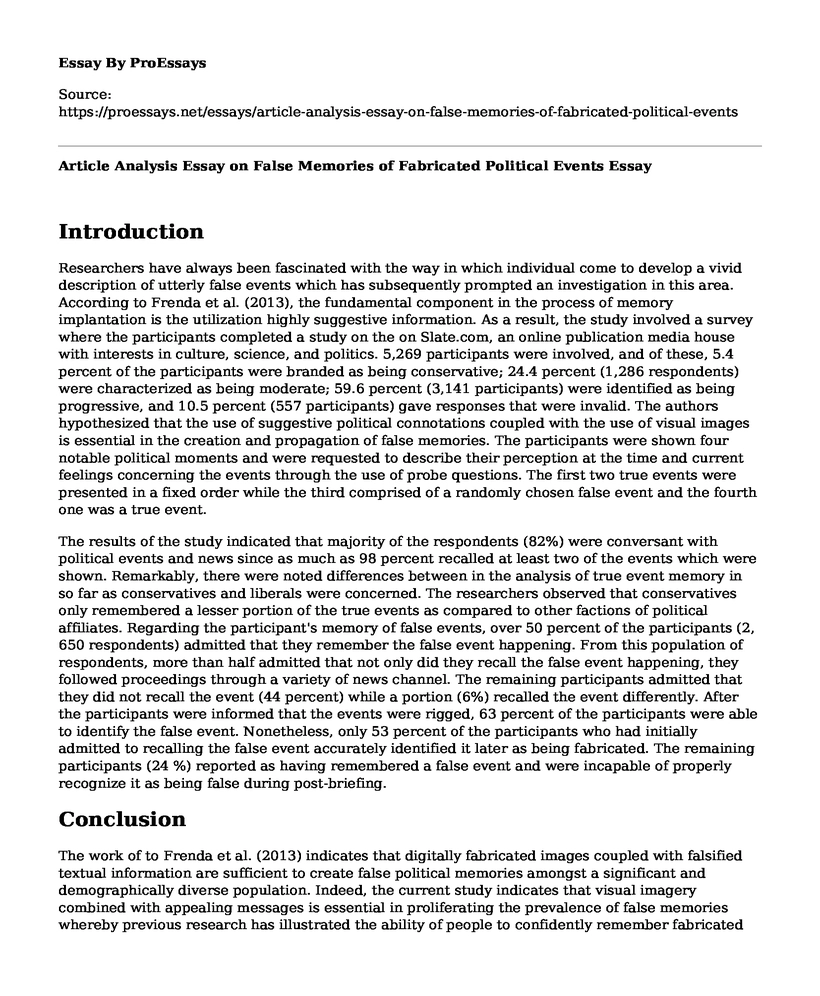Introduction
Researchers have always been fascinated with the way in which individual come to develop a vivid description of utterly false events which has subsequently prompted an investigation in this area. According to Frenda et al. (2013), the fundamental component in the process of memory implantation is the utilization highly suggestive information. As a result, the study involved a survey where the participants completed a study on the on Slate.com, an online publication media house with interests in culture, science, and politics. 5,269 participants were involved, and of these, 5.4 percent of the participants were branded as being conservative; 24.4 percent (1,286 respondents) were characterized as being moderate; 59.6 percent (3,141 participants) were identified as being progressive, and 10.5 percent (557 participants) gave responses that were invalid. The authors hypothesized that the use of suggestive political connotations coupled with the use of visual images is essential in the creation and propagation of false memories. The participants were shown four notable political moments and were requested to describe their perception at the time and current feelings concerning the events through the use of probe questions. The first two true events were presented in a fixed order while the third comprised of a randomly chosen false event and the fourth one was a true event.
The results of the study indicated that majority of the respondents (82%) were conversant with political events and news since as much as 98 percent recalled at least two of the events which were shown. Remarkably, there were noted differences between in the analysis of true event memory in so far as conservatives and liberals were concerned. The researchers observed that conservatives only remembered a lesser portion of the true events as compared to other factions of political affiliates. Regarding the participant's memory of false events, over 50 percent of the participants (2, 650 respondents) admitted that they remember the false event happening. From this population of respondents, more than half admitted that not only did they recall the false event happening, they followed proceedings through a variety of news channel. The remaining participants admitted that they did not recall the event (44 percent) while a portion (6%) recalled the event differently. After the participants were informed that the events were rigged, 63 percent of the participants were able to identify the false event. Nonetheless, only 53 percent of the participants who had initially admitted to recalling the false event accurately identified it later as being fabricated. The remaining participants (24 %) reported as having remembered a false event and were incapable of properly recognize it as being false during post-briefing.
Conclusion
The work of to Frenda et al. (2013) indicates that digitally fabricated images coupled with falsified textual information are sufficient to create false political memories amongst a significant and demographically diverse population. Indeed, the current study indicates that visual imagery combined with appealing messages is essential in proliferating the prevalence of false memories whereby previous research has illustrated the ability of people to confidently remember fabricated events.
References
False memories of fabricated political events. By: Frenda, S. J., Knowles, E. D., Saletan, W., & Loftus, E. F. (2013). Journal of Experimental Social Psychology, 49(2), 280-286.
Cite this page
Article Analysis Essay on False Memories of Fabricated Political Events. (2022, Apr 12). Retrieved from https://proessays.net/essays/article-analysis-essay-on-false-memories-of-fabricated-political-events
If you are the original author of this essay and no longer wish to have it published on the ProEssays website, please click below to request its removal:
- Whether or Not to Build The Border Wall - Essay Sample
- Maryland Dialogues on Diversity Critical Analysis Paper
- Paper Example on U.S. Political Parties: The Trump Era and Its Impact on Business
- Muslims in Western Democracies: Pluralism Tested - Essay Sample
- Rural Healthcare Quality & Accessibility: Population-Centered Policies Essay
- Free Paper Sample on Missouri Human Rights Act vs Fair Standard Act
- Free Paper Sample on Even the Rain (2010) - Netflix film







